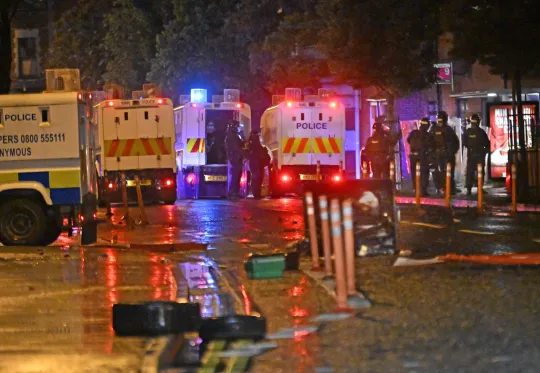Rioters threw petrol bombs, bottles and bricks at police officers in the Northern Irish capital Belfast on Monday night.
The violence erupted overnight in a series of protests across the UK since last week, with a crowd of more than 200 people gathering outside the Islamic Centre in Belfast.
According to the Belfast Telegraph newspaper, police and drones were on the scene and police also used Attenuating Energy Projectiles (AEP) against the rioters.
Monday night’s violence was largely driven by Loyalists, who traditionally oppose Irish nationalists who seek unity between Northern Ireland and the Republic of Ireland. First Minister Michelle O’Neill wrote on X following earlier disturbances on Saturday, which saw some businesses owned by Muslim refugees destroyed or damaged:
“There is no place anywhere on our island for racism or attacks on minority communities.”
O’Neill also said it is “essential to ensure that those responsible for causing and orchestrating the racist violence on Saturday face the full force of the law.”
Protests by disgruntled residents
Britain has been gripped by riots for days, with crowds spewing racist and Islamophobic remarks, attacking Muslims, minorities and migrants.
The riots were fuelled by misinformation circulating on the internet that the suspect arrested after a fatal stabbing in Southport, England, last week was a Muslim asylum seeker, which turned out to be a false claim.
Three little girls were killed and five other children were seriously injured in the knife attack while attending a dance class last Monday.
Groups of disgruntled people are preparing for more violence targeting asylum and immigration centres in London and across the UK on Wednesday.
On Tuesday, the UN Human Rights Office expressed concern over the ongoing violent protests in the UK. Noting that the Office is closely following the unrest and violence that has erupted in different parts of the country over the past few days, a spokesperson for the Office told Anadolu Agency:
“As in any other State, we are concerned at violent incidents, including attacks on police, as well as instances of islamophobia and attacks against mosques, attacks against centres housing asylum seekers and migrants, and anti-migrant rhetoric.”
Thameen Al-Kheetan emphasised that while the right to peaceful assembly is fundamental, it must always be exercised peacefully. He also added:
“Advocacy of racial or religious hatred that constitutes incitement to discrimination, hostility or violence, is unacceptable and must be prohibited.”
He also welcomed the UK government’s commitment to tackling violence under the law at the “highest level.” Al-Kheetan also added:
“We urge the Government effectively to respond to incitement to hatred — especially when it targets segments of the population who are in the most vulnerable situations, such as asylum seekers — in a manner that complies fully with international human rights norms and standards.”
